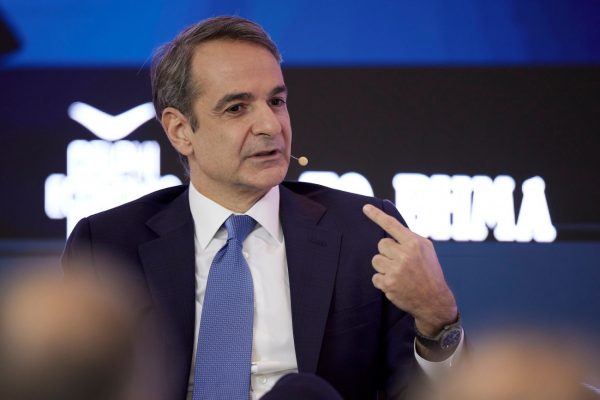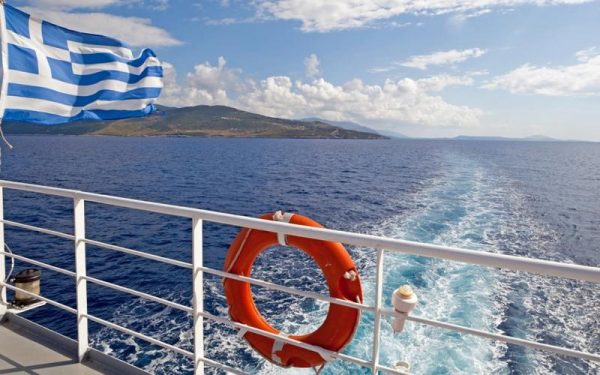
The companies of the IGI Poseidon consortium that manages the EastMed gas pipeline project continue its technical maturation work, normally.
This is reported to OT by well-informed sources, who are able to know the moves of DEPA and Edison (IGI Poseidon). In this way, the same circles comment on the latest developments regarding the change of the US attitude towards the Israel-Cyprus-Greece-Italy pipeline.
The consortium, according to the sources with whom OT spoke, is in the process of a series of studies in order to reach the point of making the investment decision for the implementation of the project. In recent months, as the special research vessel, “Nautical Geo” carried out geophysical surveys in the sea areas of Crete and Cyprus in order to determine the optimal route of the pipeline. The vessel had been harassed by the Turkish navy, using as an excuse that its course was in sea areas to which Ankara has rights under the disputed Turkish-Turkish memorandum.
According to the same information, “Nautical Geo” is planned to be out again soon for depth soundings in a sea area between Greece and Italy.
Sources report to OT that IGI Poseidon insists on its position concerning the economic viability of the pipeline, citing recent high gas prices. In fact, interlocutors of OT typically claim that “EastMed was sustainable with much lower gas prices”. However, the same circles recognize the geopolitical dimension of the project and the relative diplomatic tensions that are caused. However, according to them, the technical and financial viability of the pipeline is not in question.
It is also recalled that the preliminary environmental study of the pipeline was recently put to public consultation.
The investment plan
The EastMed pipeline is an ambitious investment plan by DEPA and Italian Edison dating from the early 2010s.
The project was designed with the political support of the countries of Greece, Israel, Cyprus and initially Italy and the European Union. It aims to transport quantities of natural gas from the fields of the Southeastern Mediterranean, specifically Cyprus and Israel to the EU.
The countries of Greece, Cyprus and Israel had signed a transnational agreement for the project in January 2020, while the USA was an ardent supporter of the approximately 1,900 km – long pipeline.
In April 2021, on the political initiative of the Ministers of Energy of Greece, Kostas Skrekas and Israel, Jouval Steinic, a total of eight countries (Greece, Israel, Cyprus, Bulgaria, Romania, Serbia, Northern Macedonia and Hungary) sent a letter to the Commissioner for EU Kadri Simpson of whom they asked for the support of the project as well as the alternative route of the quantities of natural gas to the countries of the Balkans and Central Europe. It is recalled that EastMed is designed to end up underwater in Italy.
Its expansion to the aforementioned Balkan countries will take place through interconnected pipelines. The gateway for the transfer of gas quantities is planned to be the Greek natural gas system to which EastMed will be connected.
The launch of the pipeline aims to diversify the EU’s energy supply sources, given that the main supplier of the Bloc is the Russian Gazprom.
The quantities of natural gas that would be transported through the pipeline were estimated at 10 to 20 billion cubic meters.
The EU has included the EastMed pipeline in projects of common interest and to this end is funding preliminary and other studies.
Latest News

DM Dendias: We talk With Turkey But We Always Bring Up Their Unacceptable Positions
Second and last day of closely watched conference, entitled 'Metapolitefsi 1974-2024: 50 Years of Greek Foreign Policy', also included appearances by PM Mitsotakis, Ex-PM Tsipras and PASOK leader Nikos Androulakis, among others

Rhodes Airport Tops Fraport Greece’s Regional Airports in 2024 Performance
According to Fraport's data, more than 35 million passengers (specifically 35.2 million) were handled by Fraport-managed airports during the 11 months.

European Central Bank Cuts Interest Rates by 25 Basis Points
It is the fourth cut of interest rates by Europe’s central bank, a move expected by the markets and financial analysts leading to the rate settling at 3%.

Airbnb: New Measures Add €600 in Extra Costs for Property Owners
Property managers face an immediate administrative fine of 5,000 euros if access to the inspected property is denied or any of the specified requirements are not met.

Economist: Greece Included in the Best Performing Economies in 2024
Meanwhile, Northern European countries disappoint, with sluggish performances from the United Kingdom and Germany.

EasyJet Expands Its Routes from Athens
The airline’s two new routes will be to London Luton and Alicante and they will commence in summer 2025.

Capital Link Forum Highlights Greece’s Economic Resurgence; Honors BoG Gov Stournaras
Capital Link Hellenic Leadership Award recipient, Bank of Greece Gov. Yannis Stournaras, an ex-FinMin, was lauded for his pivotal role during Greece’s economic recovery

Tourist Spending in Greece Up by 14%, Visa Card Analysis Shows
Greece’s capital Athens emerged as the most popular destination, recording a 17% increase in transactions with Visa cards, surpassing even the cosmopolitan island of Mykonos.

Inflation in Greece Unchanged at 2.4% in Nov. 2024
The general consumer price index (CPI) posted a 0.4% decrease in November compared to the previous month

2024 Christmas Holidays: Extended Shop Hours Schedule
The 2024 Christmas Holidays extended shop hours schedule commences on Thursday, December 12 and runs until the end of the year.

![Φυσικό αέριο: Δυναμικό come back του LNG στην Ελλάδα [γραφήματα]](https://www.ot.gr/wp-content/uploads/2023/01/OT_naturalgas-90x90.jpeg)












![Fraport: Πάνω από 35 εκατ. επιβάτες στα αεροδρόμια το 11μηνο – Πτώση στη Μύκονο [πίνακας]](https://www.ot.gr/wp-content/uploads/2022/06/fraport-90x90.jpg)


















![Φυσικό αέριο: Δυναμικό come back του LNG στην Ελλάδα [γραφήματα]](https://www.ot.gr/wp-content/uploads/2023/01/OT_naturalgas-600x474.jpeg)








 Αριθμός Πιστοποίησης Μ.Η.Τ.232433
Αριθμός Πιστοποίησης Μ.Η.Τ.232433